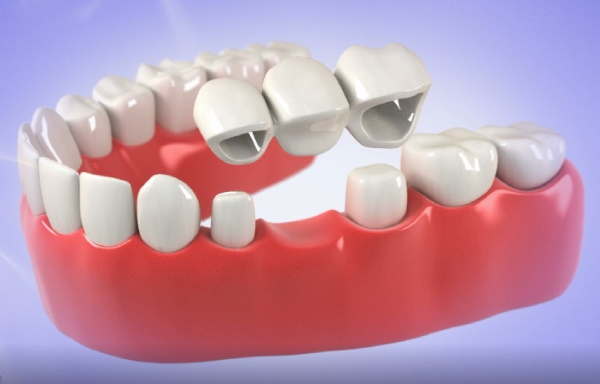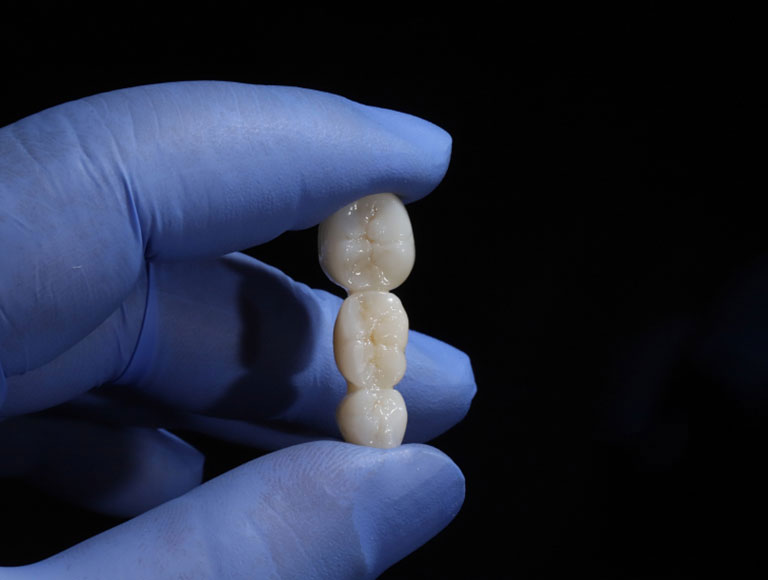What is a Dental Bridge?
Bridges are fixed dental restorations made to replace missing teeth by getting support from adjacent teeth on both sides of the gap. The teeth that support the bridge are known as abutments, and the ones that fill the gap are pontics. Compared to traditional removable dentures, bridges are in a fixed position and can only be removed by a dentist when needed.
Dental Bridge Types
There are four main types of dental bridges:
Traditional dental bridges are composed of false teeth that are held in place by crowns cemented to the abutment teeth. A traditional bridge is the most popular type, and it can be used only if you have natural teeth on both sides of the gap.
A cantilever dental bridge works like a traditional bridge, but the pontic is held in place by a crown cemented to the abutment tooth. It only needs one natural tooth next to the missing gap to work.
A Maryland dental bridge works similarly to a traditional bridge but has two natural abutment teeth on each side of the gap. Unlike traditional bridges that use dental crowns, a Maryland bridge uses a framework made of porcelain or metal bonded onto the backs of abutment teeth. Like traditional bridges, a Maryland bridge can only be used when you have natural teeth on both sides of the gap.
Implant-supported bridges use dental implants instead of crowns or frameworks as abutments. One implant is placed surgically for every missing tooth, and these implants can hold the bridge in position. If that’s not possible, the bridge may have a pontic supported between two implant-supported crowns.
Why Do I Need a Dental Bridge?
When your permanent tooth falls out, the surrounding teeth will automatically shift into the gap left by your tooth, causing them to become loose, tilt, or create a plethora of oral health issues. The teeth on the opposite jaw can also affect the bite and place additional stress on the neighboring teeth and jaw joints. Since the teeth have tilted or shifted, they are more susceptible to decay, as cleaning them becomes more difficult. The jaw can also shrink, making you look older than you actually are, as you’ll develop distorted lips and sunken cheeks. The bridge acts as a replacement for the missing tooth, preventing these events from occurring and allowing you to smile with a complete set of teeth.


Dental Bridge Cost
Dental bridge cost varies, as it often depends on the type of bridge, materials used, and any additional dental work required. An all-porcelain bridge is more reliable and durable but is more expensive than a metal or porcelain-fused bridge. For dental bridges in Costa Mesa, some insurance providers may cover a part of the cost depending on your case, but oftentimes, you’ll still end up paying a significant portion of the total cost.
How Much Do Dental Bridges Cost?
The cost for a dental bridge at Dentistry At Its Finest is estimated to range from $1,500 to $5,000, depending on the type of bridge you select. A traditional dental bridge typically costs between $2,000 – $5,000 for a pontic and a crown for each abutment tooth. Maryland dental bridges vary between $1,500 and $2,500 for one pontic tooth.
This can be affordable as dental insurance does help pay for tooth bridges. The price increases for an all-porcelain bridge compared to a metal or porcelain-fused bridge.
Costa Mesa, Dental Bridges
If you have one or more missing teeth, dental bridges are the best choice. Schedule an appointment today to see why our patients in Costa Mesa, California, benefit from dental bridges. If you are nearby, we’ll be happy to assist you and answer your questions about this treatment, insurance options, or any other inquiries you may have. Don’t spend another day with a broken smile—visit our Dental Bridge California office today.
Read more about What is Restorative Dentistry?

Missing Teeth Problems
Are you missing multiple teeth? Maybe you have whole arches of teeth that need to be replaced. Dental bridges can help fill in the gaps left by missing teeth while providing long-lasting support.
But why should missing teeth be replaced in the first place, and what benefits do dental bridges offer?
Replacing missing teeth can help improve your overall oral health and can also prevent further problems from arising. Some of these problems may include:
- Shifting teeth
- Overcrowding
- Misaligned bite
- Gum disease
- Tooth decay
Replacing missing teeth with restorative options like dental bridges can help prevent these problems with the right dental care.
Dental Bridge FAQ
How long does a dental bridge last?
Dental bridges can last from 5 to 15 years, with an average lifespan of 10 years. Expect your bridges to last longer if you practice good oral hygiene and maintenance. Dr. Michael Ayzin, DDS, will make sure that your dental bridges last for years.
Is a dental bridge permanent?
Fixed bridges are securely attached to the teeth and cannot be removed. They are kept in place with a special dental cement or an implant-supported prosthetic. A removable bridge is also possible, but if the gap is too large or there are no healthy teeth to support it, a fixed bridge will always be used. Dentistry At Its Finest will ensure that your bridges are of the highest quality.
How soon after extraction can I get a bridge?
In some cases, a bridge can be fitted right after your tooth is extracted. However, in general, dental offices such as Dentistry At Its Finest wait for around 8 to 12 weeks for the area around the jawbone and extraction site to heal before placing a bridge.
Does food get stuck under a dental bridge?
Bridges are meant to have the same spacing as your natural teeth, but there can be an open space between the gum and the bridge, which allows food particles to get trapped. This can cause tooth decay, bad breath, and even gum disease. We recommend practicing proper oral hygiene, including brushing, flossing, and rinsing your mouth regularly.
Can a tooth get infected under a bridge?
Yes. A tooth under the bridge can get infected if there is a significant gap between the bridge and the gum. It can also occur if the patient lacks proper oral hygiene. When food gets trapped, bacteria cause plaque buildup. If plaque isn’t removed, it can lead to periodontal disease, tooth decay, and gingivitis.
Can you bridge your front teeth?
Yes. It is possible to bridge the front teeth, as they are not under as much pressure as the back teeth. Any type of bridge will work for front teeth.
Does getting a bridge hurt?
No. Dentists use a local anesthetic to numb the area before the treatment begins. You’ll feel no pain at all as the bridge is installed in your mouth.

Affordable Dental Bridges Near Me in Costa Mesa, CA
Looking for dental bridges near Costa Mesa, CA? Look no further. Dr. Michael Ayzin provides high-quality dental bridges at Dentistry At Its Finest.
Choosing a dentist near where you work, study, or live is essential, as it can save you time and money. For Costa Mesa dental bridges, expect several treatments and follow-up appointments in addition to your routine visits. Since treatment for dental bridges in Costa Mesa requires multiple visits, having a dental office nearby makes the process more convenient.
Call us at (714) 540-5511 or request an appointment online today.
